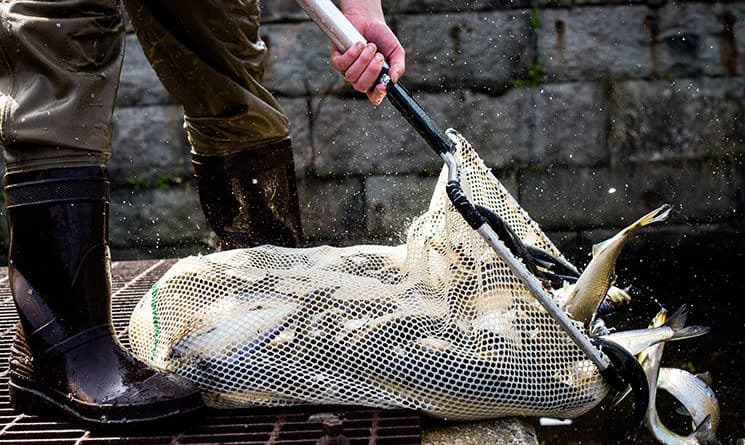If there’s one thing that river herring love, it’s the Seacoast’s unique inland estuary system. Saltwater and freshwater mix as the tide rolls in and out, creating a perpetually changing habitat for fish and wildlife. And that’s exactly the sort of water that alewife and blueback herring — two species of herring known as anadromous fish — look for each year. They’re born in freshwater but migrate to the sea to live their lives, and then return to freshwater rivers to spawn and hatch future generations.
Those herring need a little help getting to where they need to go, though — especially along the Lamprey River, home to one of the biggest river herring runs on the East Coast. That’s where Herring Aid comes in. The annual event organized by the Lamprey River Advisory Committee and N.H. Fish and Game brings out volunteers and the public to help herring migrate upstream past dams and other barriers, thereby keeping the fish, and the river and estuary, healthy. This year’s event takes place on May 7 at the Macallen Dam in downtown Newmarket. Participants have the chance to count fish, carry fish from below the dam, and maybe even see baby American eels and sea lampreys.
“Herring Aid is an opportunity to get up close and personal with one of our area’s most dramatic springtime phenomena: the mass upstream migration of river herring,” says Suzanne Petersen, outreach specialist with the Lamprey River Advisory Committee.
While the river herring’s population is seen as relatively healthy, there is a massive decline in overall numbers, to the point that it has been recognized by the federal National Oceanic and Atmospheric Administration as a species of concern. One significant threat to the species comes in the form of man-made dams that serve as unnatural physical barriers to the fish’s safe passage upstream to its freshwater spawning grounds.
As herring travel up the Lamprey — called “the state’s most significant river for all anadromous fish species” by Fish and Game — one of the most significant impediments they encounter is the Macallen Dam.
Adult fish typically enter the river systems from their ocean homes, travel upstream to spawn through May and June, then find their way back downstream. The juvenile herring stay upstream throughout the summer and then, in the fall, find their way toward the ocean, where they continue to swim in large schools and feed on plankton. After a few years at sea, they too begin the cycle of reproduction and embark on the annual journey upstream to spawn.
“These migrations, once a defining part of life on most rivers along the East Coast, have been greatly reduced and even lost in many places. The Lamprey River is a success story about beating the odds,” Petersen says.
The Macallen and other dams have “fish ladders,” systems that provide fish a way to pass through the dam on their own. However, many fish are unable or unwilling to pass through the ladders and remain trapped at the foot of the dam. During the migration season, and especially for the Herring Aid event, Fish and Game officials leverage the assistance of volunteers to physically transport the fish over the dam. Though many dams are being disassembled to restore natural water flow (Exeter’s Great Dam is one such dam slated for removal), many, like the Macallen, cannot be taken down because of economic or logistical issues.
Herring Aid has helped local fish populations. Because the fish are all in one place, officials can count the fish passing through. In recent years, more than 200,000 fish per year have been counted passing through fish ladders on New Hampshire rivers, while in past years, only some 35,000 were recorded.
According to Fish and Game, a count of river herring in the Lamprey in 2015 found more than 100,000 fish. However, other rivers, like the Taylor River in Hampton and the Merrimack River in the southern part of the state, have seen steep declines in the number of returning herring. Events like Herring Aid and similar conservation efforts help raise awareness about herring preservation and the health of estuary systems and ensure that some fish make it over the dam to breed.
Herring Aid takes place Saturday, May 7 from 10 a.m. to noon, rain or shine, at the Macallen Dam in downtown Newmarket. The event is free; parking is available in the public lot behind the Newmarket Public Library at 1 Elm St.
To contact Rich Collins, visit https://www.thirstproductions.com/.

